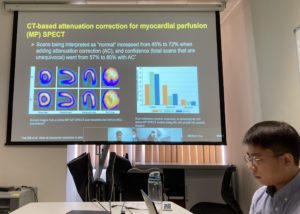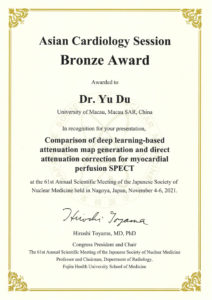A research team from the Biomedical Imaging Laboratory (BIG), University of Macau (UM) recently attended the 61st Annual Scientific Meeting of the Japanese Society of Nuclear Medicine online. Du Yu, a PhD student from the lab, won the bronze prize in the Asian Cardiology Session for an artificial intelligence-related work to enhance myocardial perfusion single photon emission computed tomography (SPECT) image quality, and to reduce radiation exposure on patients from unnecessary CT scans.
Held in Nagoya, Japan, the event attracted over 2,000 scholars and doctors, as well as the submission of over 300 scientific abstracts all around the world. Competing in the event came from various research institutes of nuclear medicine in Asia, including Peking Union Medical College Hospital and Beijing Chao-Yang Hospital, Capital Medical University, in mainland China; Queen Mary Hospital in Hong Kong; Far Eastern Memorial Hospital in Taiwan; Chonnam National University Hwasun Hospital in South Korea; Nihon University Hospital and Ehime University Graduate School of Medicine in Japan; and Institute of Nuclear Medicine & Allied Sciences (Dhaka) in Bangladesh.
The technique of attenuation correction (AC) can enhance the image quality and diagnostic accuracy from SPECT by reducing artifacts and improving quantitative accuracy. However, additional CT scans are needed for AC. In Du’s project titled ‘Comparison of Deep Learning-based Attenuation Map Generation and Direct Attenuation Correction for Myocardial Perfusion SPECT’, the researchers used non-AC-SPECT images to generate attenuation maps for AC or directly generate AC-SPECT images with deep learning methods, which is similar to the effect of using real CT for AC. The proposed methods can reduce unnecessary CT scans and associated radiation exposure to patients. In addition, the methods can alleviate the potential mismatch problem between SPECT and CT images, and provide an AC solution for dedicated cardiac SPECT systems without CT equipment.
This project was led by Greta Mok, an associate professor in the Department of Electrical and Computer Engineering, Institute of Collaborative Innovation, and the Ministry of Education Frontiers Science Center for Precision Oncology. It was a collaboration between UM and the Department of Nuclear Medicine and PET/CT-MRI Center, the First Affiliated Hospital of Jinan University, and funded by the National Natural Science Foundation of China’s Excellent Young Scientist Grant (file number: 81922080).
澳門大學科技學院生物醫學影像實驗室研究團隊於線上參加“第61屆日本核醫學會學術總會",其中博士研究生杜宇的人工智能研究使病人免於採集CT圖像、降低不必要的CT輻射獲其中亞洲核醫心臟學會議獎勵第三名。
是次會議由日本核醫學會於日本名古屋舉行,今年有超過兩千名學者與醫生參加,收到超過三百份論文進行評比。該項競賽的隊伍包括來自北京協和醫院、首都醫科大學附屬北京朝陽醫院、香港瑪麗醫院、台灣亞東紀念醫院、日本大學醫院、韓國全南大學醫院等核醫學研究團隊。
“衰減校正”能減少偽影、提升SPECT影像品質與診斷準確性,但需要另外的CT採集。杜宇的研究——“基於深度學習的衰减圖生成和直接衰减校正應用在心肌灌注單光子發射電腦斷層掃瞄 (SPECT)的對比研究 ”,主要是利用病人的未衰減校正SPECT影像,通過深度學習方法,生成衰減圖進行衰減校正或者直接生成衰減校正後的圖像,效果與利用真CT作衰減校正相仿,此方法能夠使病人免於採集CT圖像,降低病人在檢查中受到的輻射劑量,並且能解決SPECT與CT之間的對位誤差,以及心臟專用SPECT缺乏CT裝備的問題。
該研究項目的指導老師為澳大電機及電腦工程系、協同創新研究院與精準腫瘤學前沿科學中心副教授莫昇萍,合作單位為暨南大學附屬第一醫院核醫科,項目獲國家自然科學基金優秀青年科學基金資助 (檔案編號:81922080)



